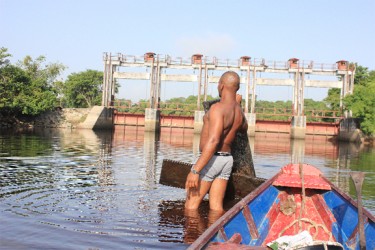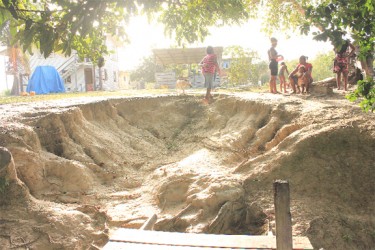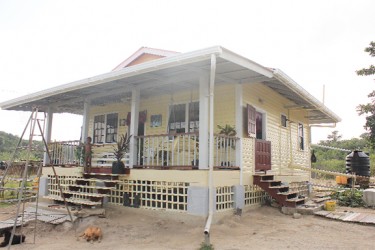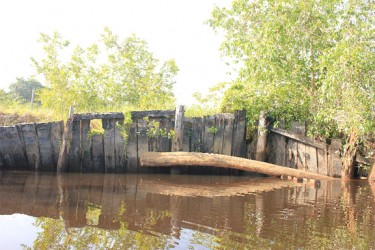The head of the Torani Canal has become progressively shallower as the banks of the canal are eroding and sliding into the water. This is where the Guyana Sugar Corpora-tion Inc’s (GuySuCo) five-gates sluice is located, that allows water to flow from the Berbice River into the Canje River, in order to maintain the levels of the latter for irrigation purposes.
This situation, according to workers who operate the gate for the sugar company, could pose a great risk to the sugar cane plants and the crops of farmers in Region Six, as less water is flowing into the canal from the Berbice River.
According to Aubrey Harris, who worked all his life on the five-gates compound before he retired and whose three sons continue to operate the gates, the last contractor that dug the canal used the same silt which was dug up to shore up the shoulders of the banks. This is not supposed to be done as the silt is just sand.

“They had to get mud to do this and they would have had to fetch it from the back which would have cost more. I tried to stop them from doing that [using the silt] but they just did it anyway,” Harris told the Sunday Stabroek during a recent visit to the area.
He said that now they are seeing the effects of the “cock work that they did.”
Harris said because the canal is filling up, the flow of the water has severely slowed and this could mean disaster, especially in the light of the fact that the country is facing a dry spell.
He along with his three sons − Regan, Rouqueston and Richardo − are strongly advocating that the canal be re-dug as this is the only way the problem can be rectified.
“If you watch at it, is sand, and the sand is coming down into the canal and filling it up because sand does move. They have to come and re-dig the canal but they must do the paaling with mud and not with the same silt that they dig from the canal, because it would slide down again since the foundation is not firm,” Harris explained.
He also pointed out that the paaling is made of wood and parts of it are already rotten because it is constantly in water.
“It is not that the workers are not working, is that you are just getting a bit of the water because of the banks eroding,” he explained.
Harris thought that the workers might be blamed for the slowness and decrease in the volume of water, but he said “the water is not irrigating and it is barely rising and then it goes down immediately.”
He also pointed out that there are a few inlets that are supposed to be blocked to ensure that some of the water does not go inland instead of straight to the Canje River. Furthermore, there is a need for the canal to be urgently cleaned because the overhanging branches also slow up the flow of the water.

In September 2010 in response to a story this newspaper had done on the deplorable condition of the Five Gates compound, GuySuCo had stated that the canal linking the Berbice and Canje Rivers was 14 miles long. The corporation said that the 44-mile long Canje River is the only fresh water source in Region 6 and whenever water levels are low, the Torani link canal allows for an intake of water from the Berbice River.
GuySuCo had explained there are constant efforts to maintain an acceptable water level in the Canje River, since it is critical to agriculture production in Region 6. Apart from supplying the estates of Skeldon, Albion and Rose Hall with fresh water, it also supplies the Manarabisi rice cultivation of approximately 17,000 acres and Black Bush Polder also with approximately 17,000 acres. “The free flow of water in the Canje River is also critical for the transportation of farmers, goods and services and to allow vessels playing the route to take fuel to the pump stations along the river,” the sugar company had said in a release.
‘Timing the flow’
Harris’s sons once again complained about the conditions under which they are forced to work and questioned whether the company cared about their wellbeing and that of their families.
Their father explained that the work is basically timing the flow of the water to ensure that the gates are opened and closed at the precise times.

“I think it is the same thing mek I get sick, you know you are not working in a house, in a building. You have to come and sit down and look at the water…the doctor did not say it was that but he said it was cold,” Harris, who has been working at the compound since he was seventeen years old said.
He pointed out it is a “day and night work and it is a tidal work, rain or sun you have to be in the weather.”
And because the sugar company only provides fuel for the generator to work between 6pm and midnight the workers said many times they are forced to walk in darkness to the pumphouse to turn on the generator just to operate the gate.
To avoid this the workers said sometimes they would start up the generator at 8pm instead of 6pm so as to ensure that it is still in operation when they have to close or open the gates.
“They have to start up the generator to open the gate and when they are finished they have to take it off back. That does not make sense because when they have to ready close the gate again is the same thing and they have to walk in darkness − that does not make sense,” the senior Harris said.
According to the workers other GuySuCo compounds have running water and electricity from 6pm to 6am.
Explaining the importance of opening and closing the gates at the precise times Harris said, “You don’t make a mistake and say you going and come back because that is the boss… by the time you mek a lil spin and you lapse by the time you come back the gate can’t close no more or it can’t open no more because you come too late. You have to be on time with this work.”
According to the men it is not that the authorities do not recognize the importance of the Torani compound, but because the compound is in a very remote area away from the “limelight” they just tend to “give a nice chat and by the time they reach about forty miles away they forget about Torani.”

They said those who visit must see the need for things to be done to make the workers more comfortable, which will ensure that they work more effectively.
Further Harris noted that the officials do not “lapse” when it comes to providing the fuel for the generator, “but when it is things for you they don’t really care, but for GuySuCo work it must go on; they don’t care about the people who work here.”
And it is the workers who have to clean the compound while in the past when the compound was managed by the Ministry of Agriculture and the region it would be cleaned regularly and be maintained.
In 2010 this newspaper had reported about the deplorable conditions under which the workers lived in a dilapidated two-storey house, but since then the sugar company built two houses which are occupied by two of the workers and their families. The third son, with whom the senior Harris and his wife lives, continues to live in the upper flat of the same dilapidated building which according to him is bat infested. He said the bats pose a threat to their health and he was forced to remove his young child from the home because of this. And whenever it rains the roof of the house leaks.
And while the sugar company had promised to make a landing for the workers and their children to use, this has not been done and it continues to be a very dangerous process to get to and from the river. Because there is no running water the women and children are forced to fetch water from the riverside which itself poses a risk to them.
One of the houses which has been built is equipped with a bathroom and toilet, but the occupants still have to fetch water from the riverside in order to use these.
Many years ago a toilet and bathroom were also built on the compound but there was never any running water so it was just a white elephant, as the workers preferred to bathe at the riverside instead of fetching water from the river.
The senior Harris recalled that he got the job at the age of 17 and he was encouraged to take it by Minister of Home Affairs Clement Rohee’s father, who in those days worked on the compound.
“All of my working life I dedicated to the region and then GuySuCo,” Harris, who retired five years ago, said.
He said back in those days the compound was clean and fenced but at present there is no fencing and the cows roam the compound with impunity at times even eating the washing the workers leave on the line.








